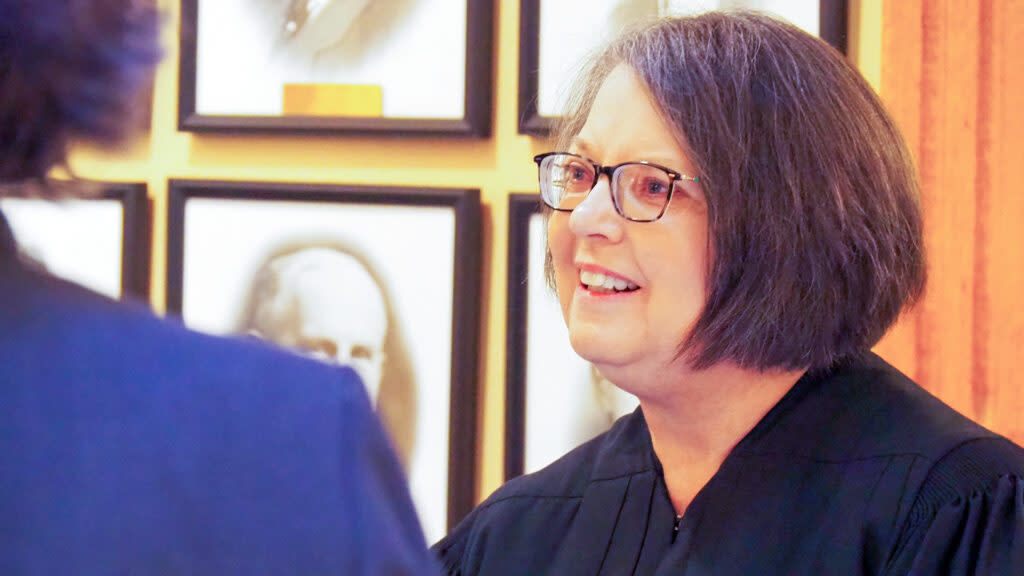Kansas Supreme Court affirms criminal case appeals may continue after offender’s death

- Oops!Something went wrong.Please try again later.
Kansas Supreme Court Chief Justice Marla Luckert said in a dissent the court's majority was wrong to stick by a 2014 opinion that provided a mechanism for appeals filed by people convicted of criminal acts to continue even if the defendant died during appellate proceedings. (Rachel Mipro/Kansas Reflector)
TOPEKA — Chief Justice Marla Luckert retained a lonely position as the only member of the Kansas Supreme Court convinced appeals of criminal convictions shouldn’t be allowed to proceed through the judicial system after the defendant’s death.
The issue surfaced amid the Supreme Court’s review of an appeal on behalf of the late David Moeller of Oskaloosa, who was convicted in 2021 of securities fraud in Jefferson County and died in 2022.
Jefferson County prosecutors alleged Moeller scammed Diane Brunner by convincing her to write him a check for $9,500. It was to be her seed-money investment in a Moeller company manufacturing the “Blade Caddy,” a case used to carry knives or blades. Evidence at trial indicated Moeller used the cash to pay a separate business debt and didn’t make an effort to commercialize the Blade Caddy.
He was convicted in district court, but died before his attorney filed an appeal challenging sufficiency of the evidence. Moeller’s published obituary said he had been a self-employed entrepreneur and noted his hobbies included “wheeling and dealing.”
The Kansas Court of Appeals decided in 2023 precedent set by the state Supreme Court in the State v. Hollister a decade ago meant Moeller’s appeal didn’t die with him. The Court of Appeals also concluded there was sufficient evidence to convict Moeller.
In response, defense counsel sought review of that decision by the state Supreme Court.
Supreme Court Justice K.J. Wall’s majority opinion affirmed the Court of Appeals’ perspective in the Moeller case. The Supreme Court declined last week to exonerate him and affirmed the death of a criminal defendant during appeal of his or her conviction didn’t automatically end the case.
In a dissent, Luckert said Kansas courts didn’t have standing to weigh criminal appeals if the person was deceased. She argued absence of a living defendant meant there was no longer a client to guide an attorney pursuing the appeal.
“Regardless of the policy reasons for the majority’s position, without a statutory process for continuing a criminal case after the defendant’s death, Kansas appellate courts lack authority, or a statutory process, to consider this appeal,” the chief justice said.
Since the 1890s, Kansas has been among a minority of states that allowed criminal appeals to proceed after a defendant passed away.
Wall’s opinion said the justices weren’t convinced reversal of Hollister would create a greater good, because the 2014 decision struck a balance between competing interests.
“We continue to adhere to Hollister,” Wall’s opinion said. “For one, we are not clearly convinced Hollister was originally erroneous. Furthermore, we are not clearly convinced that more good than harm would come from departing from Hollister.”
The Kansas attorney general opposed reversal of Hollister because that step could be harmful to crime victims, said Kris Ailslieger, deputy solicitor general in Kansas.
“It maintains an opportunity for the defendant to try to clear his name,” Ailslieger said. “At the same time, it allows the state to pursue its interest in getting issues of statewide importance clarified, ensuring a valid conviction remains on the books. Victims have proper closure for injuries and restitution remains in place.”
Randall Hodgkinson, an appellate public defender who represented Moeller, urged the Supreme Court to replace Hollister with a process that removed all proceedings in criminal cases from the court record when a defendant died before conclusion of appeals.
“This court could adopt a new procedure,” Hodgkinson said. “This court has the inherent power within its own constitutional authority to make rules of appellate procedure.”
The post Kansas Supreme Court affirms criminal case appeals may continue after offender’s death appeared first on Kansas Reflector.

